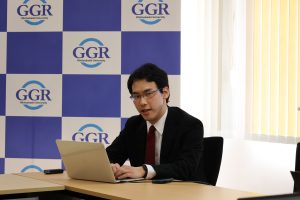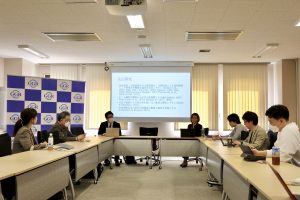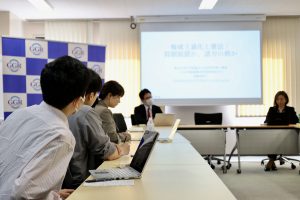On March 22, 2023, the Institute for Global Governance Research (GGR) hosted its 13th GGR Brown Bag Lunch Seminar on “Autocratization and the constitutions: Double-edged swords for democracy?” with Mr. Takuto Tohkairin, a Ph.D. student in the Graduate School of Arts and Sciences at the University of Tokyo and a research fellow of Japan Society for the Promotion of Science.
Mr. Takuto Tohkairin’s research focuses on the relationship between countries that are becoming authoritarian and their national constitutions. As democratic backsliding is widely observed in many countries around the world, Mr. Tohkairin posed the question, “Under what kind of institutions do democratically elected leaders choose to become authoritarian?” He pointed out that the factors that make it easier for leaders to become authoritarian include political structure, the relationship between the government and the judiciary, and the declaration of state of emergency. He pointed out that a comparative constitutional perspective, which influences the implementation of legitimate authoritarianization, is missing.
He then formulated several hypotheses, including the constitution that defines the costs and incentives of autocratization, the constitution as the target of autocratization, and the presence or absence of various provisions in the constitution. As a way to test these hypotheses, Mr. Tohkairin analyzed variables in Varieties of Democracy (V-Dem) for all sovereign states from 1946 to 2020. The results support the hypotheses that the country is more likely to become authoritarian when (1) the constitution provides for the dismissal of the leader, (2) the constitution does not provide for the immunity of the leader, (3) the constitution provides for term limits for the leader, (4) the constitution provides for the leader’s veto legislation, and (5) the constitution provides for the leader’s right to dissolves parliament. This study points out that restrictive provisions on the political life of the leader rather than constitutional restrictions on the government strengthen the incentive for leaders to become authoritarian, and that the leader is less likely to become authoritarian when the constitution stipulates an electoral system for the assembly.
The Q&A session was attended by about 15 students and faculty members from Hitotsubashi University, who asked lively questions and made comments. Some asked what the differences in dismissal and immunity seen in the hypotheses were, and what kind of material Mr. Tohkairin would like to deal with if he were to analyze leaders’ discourses in the future. There were also comments on the possibility that economic disparities and international conditions might affect autocratization, and what would happen if the counterfactuals were examined. Agreeing with these comments, as to whether or not the counterfactual relationship is valid, Mr. Tohkairin responded that previous studies have pointed out that autocratization can occur even without constraints, but this study can suggest that autocratization is more likely to occur when constraints are too strong.
【Event Report prepared by】
JEONG Minhee (Ph.D. student, Graduate School of Law, Hitotsubashi University)



